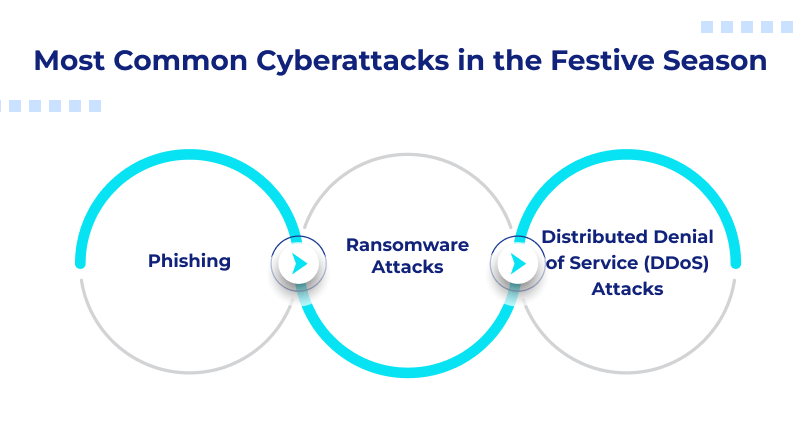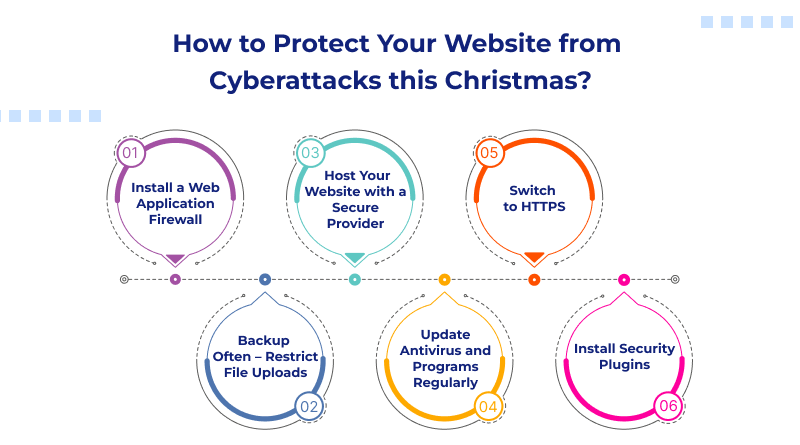Christmas is about to arrive, and before that, all eCommerce stores and brands will run compelling campaigns to attract customers. Consumers shopping online look for affordable and the best Christmas web hosting deals. This also means it creates more opportunities for cybercriminals to strike websites. The cyber scams are taking place during the holiday shopping season. As we are getting busy with our holiday shopping and preparations, keeping website security in mind is crucial.
During this festive season, ensure your personal and professional information is safe. You can host your websites with web hosting plans offering free SSL certificates. It safely encrypts the sensitive information available on the website.
Table Of Content
Most Common Cyberattacks in the Festive Season

1. Phishing
Phishing tricks people into giving away sensitive information or downloading malware. According to the FBI, phishing is the most common type of cybercrime. It constitutes more than 30% of all reported cyberattacks.
These attacks follow different patterns. These include pop-ups from questionable websites or fake emails. They are said to come from legitimate sources like banks or online retail. In most cases, customers and employees do not have any reason to verify sources. They may, therefore end up doing the attacker’s bidding.
The most common form of phishing is spoofed websites. This cybercrime takes advantage of trust because hackers can create duplicate shopping websites to steal information from users. These hackers usually manipulate people into buying counterfeit merchandise.
2. Ransomware Attacks
The research also shows that there was a rise in ransomware attacks by 30% in holidays beyond the mean monthly statistics. There was a 70% increase in ransomware attempts in Nov and Dec compared to Jan and Feb.
During holidays, traffic is at its highest volume. In such a scenario, it is hard to distinguish between legitimate and malicious traffic. Hackers blur the entire platform of the victim by using a DDoS attack. It is often combined with ransomware. Such an attack is called a triple extortion ransomware attack.
3. Distributed Denial of Service (DDoS) Attacks
As per the reports, in the first half of 2023, approximately 7.9 million DDoS attacks occurred globally, which is a 31% increase from the same period in 2022. That’s an unbelievable 44,000 attacks taking place daily. As the biggest shopping season approaches, attackers are fully aware of the fact that the damage given to businesses by DDoS attacks is costlier than ever.
The type of disruptions they can cause poses a very peculiar threat specifically to eCommerce businesses and financial institutions as internet traffic to those industries surges dramatically this holiday season.
How to Protect Your Website from Cyberattacks this Christmas?

1. Install a Web Application Firewall
A Web Application Firewall (WAF) is a software or hardware based firewall which protects web applications. It acts as a link between the website server and the data link. Technically, it reads all the data that passes through. Most modern WAFs are cloud based for a small monthly subscription fee and are offered as a plug-and-play service.
The cloud service is basically installed in front of your server and acts as a conduit for all incoming traffic. Web application firewalls offer full peace of mind by stopping all hacking attempts and filtering out other forms of unwanted traffic, such as spammers and malicious bots, once they’ve been mounted.
2. Backup Often – Restrict File Uploads
Daily data backup is often overlooked aspect by many of the website owners. It is crucial for the personal online security. In the managed WordPress hosting or VPS hosting plans, you get automated backup systems, Acronis Cloud Backup, and other solutions.
These website security measures help in making your data disaster-proof. If you’ve been infected with ransomware or malware, the only way to get your data back is to wipe your systems and recover from a recent backup.
3. Host Your Website with a Secure Provider
Website building is a simple task and a crucial process to build an online presence. You can even use AI website builder to make user-friendly websites. No matter how well the website is designed, if it is not hosted on a secured server, it will create a fuss. Hence, ensure that your website is PCI compliant web hosting company. Also, their plans must include SSL certificates to keep the website’s payment secure.
Hackers cannot intrude on the checkout process. Even search engines prefer websites that are secured and have a stable web hosting infrastructure. Also, opt out of free hosting services. Free hosting service may look attractive, but its speed is restricted, and the space shared are security threat. Rather go for one hosting service that addresses your website needs. If your website contains much sensitive information then you would need a hosting service that would ensure your proper protection and privacy for your website.
4. Update Antivirus and Programs Regularly
Updating antivirus programs regularly is the first line of defense against security threats. Your systems’ vulnerability to cybercriminals is also exacerbated by out-of-date software. As a result, make sure you install new antivirus software regularly. Here are some points to consider while purchasing an antivirus.
- Check whether the antivirus has a quick scan option. It provides you with peace of mind if you don’t have time to conduct a full scan.
- Always choose a renowned antivirus that is positively rated. There are high chance that the rumors might be true.
- Make sure it is compatible with your computer’s operating system.
- Choose an antivirus that can scan emails and file downloads. Spam emails are sometimes used by hackers to infect a host’s operating system.
Besides keeping your programs up-to-date, you should also encrypt your files using strong passwords. For added security, change them every 90 days.
5. Switch to HTTPS
Instead of continuing with HTTP, switch to HTTPS. Once you install the SSL certificate to your website, you can easily redirect the traffic from HTTP to HTTPS.
An SSL certificate can secure the transfer of sensitive information such as credit card details or personal information of your customers while transferring the information between the server and your website. This step is especially important if you have an eCommerce website. The SSL certificate is essential if you take orders from customers and accept payments through your website.
Due to the rising number of cybercrimes, search engines have also taken steps to protect users’ data. Visiting a website with an invalid SSL certificate may cause you to receive an alert message. Further, if your website has such an alert, it will increase the bounce rate drastically.
6. Install Security Plugins
There are special WordPress security plugins for the websites built on this CMS. The security plugin detects threats and keeps your website safe from them. Also, there will be no hacking attempts on your website. Use the best WordPress plugins for Magento and WordPress built websites:
For Magento:
- Watchlog Pro
- MageFence
- Amasty
For WordPress:
- iThemes Security
- WordFence
- Fail2Ban
- WPscan
- Sucuri
Technology is growing rapidly all over the world, and people are using the internet for everything. From taking consultations from a doctor’s website to buying their favorite dessert from the website of a local bakery, people visit many websites daily. And it is crucial to protect your website from any threat.
You can use the above tips to protect your website from any suspicious activity. As discussed in the article, cyber-attacks are unpredictable and you have to be alert to any possible threat. For this, you can use the tools that will notify you and alert you to take appropriate actions. This will help you to minimize the threat and keep the website secure.
Moreover, if you do not take the security of the website seriously it may lead you to a major loss. Customers would be afraid to provide their information or even buy products through your website for fear that someday the information contained on your website may be hacked.















